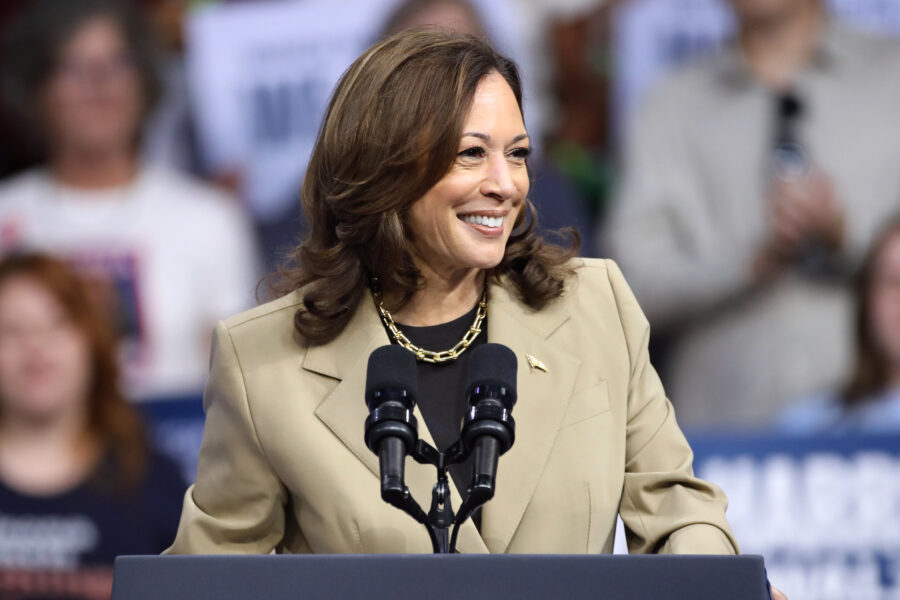Vice President Kamala Harris introduced a series of new economic measures Wednesday aimed at reducing costs and increasing capital access for small businesses and entrepreneurs.
A central part of Harris’ plan involves expanding the tax deduction for startup expenses from the current $5,000 to $50,000. According to the Congressional Research Service, this increase would better match the $40,000 many small business owners spend during their first year.
“As President, one of my highest priorities will be to strengthen America’s small businesses,” Harris said during an event in New Hampshire. “So, first we’re gonna help more small businesses and innovators get off the ground.”
Harris also proposed simplifying tax filings for small businesses through the introduction of a standard deduction, aiming to reduce both time and costs for these businesses.
Her plan includes an initiative to update regulations that currently make it harder for small businesses to secure federal funding. She also emphasized working with state and local governments to ease these barriers.
Harris unveiled a new fund designed to help the country’s smallest banks cover interest on loans to new businesses. Specific details about the fund’s size remain unclear, but Harris called for additional funding for these banks.
“We need to take away some of the bureaucracy that makes it hard to be a small business owner,” she said, explaining that her goal is to “make it easier for people to actually do something that’s going to benefit our entire economy.”
As vice president, Harris has backed Community Development Financial Institutions (CDFIs), which provide capital to low-income communities often overlooked by traditional lenders. Deputy Treasury Secretary Wally Adeyemo noted the importance of CDFIs, explaining to CNN that new businesses without financial histories often struggle to secure loans from traditional banks.
“Some new businesses go to seven different banks to try to get a loan, but they can’t get one because they don’t have a three-year track record,” Adeyemo said, adding that rising interest rates have also made it harder for small businesses to get started. “Ultimately the cost of capital is going to be something that matters a lot.”
Harris also plans to recapitalize and expand the Treasury Department’s State Small Business Credit Initiative (SSBCI), with a focus on rural America and underserved communities. Furthermore, she pledged to direct more federal contracts toward smaller businesses, a space traditionally dominated by large companies.
These proposals are part of a broader economic strategy targeting middle- and working-class Americans. Harris stressed the importance of building a strong middle class, stating during a recent speech at the Democratic National Convention, “We know a strong middle class has always been critical to America’s success. And building that middle class will be a defining goal of my presidency. This is personal for me. The middle class is where I come from.”
In addition, Harris set a goal of surpassing President Biden’s achievement of 19 million new businesses created during his term, aiming for 25 million new businesses in her first term.
During her remarks, Harris drew a sharp contrast with former President Donald Trump, arguing that rolling back parts of his 2017 Tax Cuts and Jobs Act would fund essential community investments. Harris criticized the tax cuts for disproportionately benefiting the wealthy and corporations.
One of Harris’ advisors echoed this point, telling CNN that the government should “use those expiring tax cuts to get at issues that affect the bottom line for the average American.”
Harris also advocated for a billionaire minimum income tax and increasing the corporate tax rate to 28%. She proposed quadrupling the tax on stock buybacks to ensure the wealthiest pay a fair share. However, she emphasized that her plan would not affect those earning less than $400,000 per year.
“This approach strikes the right balance,” a statement from the Harris-Walz campaign read. “It would make our tax system fairer and responsibly raise revenue to reduce the deficit and fiscal risks.”
The statement further criticized Trump’s economic record, claiming, “Trump’s economic agenda would ignite inflation…trigger a recession by mid-2025, cost more than three million jobs, and add a percentage point to inflation. As president, he left small businesses in the lurch during their time of need in the pandemic, instead helping big and well-connected corporations get funding more easily.”






